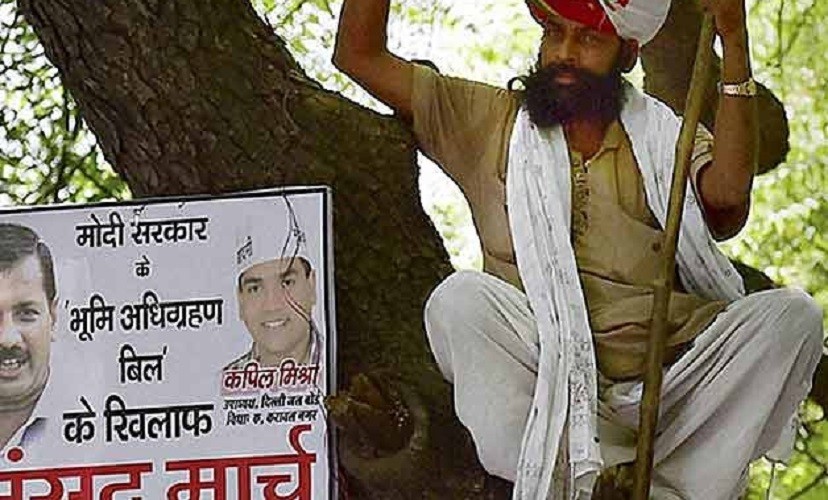Delhi Chief Minister Arvind Kejriwal is indeed an inventive genius. The maverick leader of the shadowy political outfit has proven to harbour way too many tricks up his sleeve.
 A recent incident proves how he brandished yet another new trick. After Kejriwal and his teammates got embroiled in the infamous case of abetting the alleged suicide of Gajendra Singh, a farmer from Dausa, he rushed his trusted lieutenant Sanjay Singh on an SOS mission to silence the potential witnesses against the Aam Aadmi Party. Multiple telecasts of the echoes of the hostile voices of the family members of the deceased farmer made Kejri realise that there was only one method of escaping the criminal charges against his party—mollify the likely witnesses.
A recent incident proves how he brandished yet another new trick. After Kejriwal and his teammates got embroiled in the infamous case of abetting the alleged suicide of Gajendra Singh, a farmer from Dausa, he rushed his trusted lieutenant Sanjay Singh on an SOS mission to silence the potential witnesses against the Aam Aadmi Party. Multiple telecasts of the echoes of the hostile voices of the family members of the deceased farmer made Kejri realise that there was only one method of escaping the criminal charges against his party—mollify the likely witnesses.
And so Kejriwal decided post haste, to send a cheque of Ten Lakh Rupees from his party to the family of Gajendra Singh on the spurious plea of helping them in their hour of distress. After consulting legal experts, Kejriwal and his associates had become aware of the gravity of the crime they had committed. The fact that punishment for abetment of suicide could result in imprisonment for three years, prompted the AAP leaders to opt for the legally questionable road of influencing the witnesses.
Prima facie, the dirty trick devised by Kejriwal has helped the AAP to some extent by softening the hostile attitude of the family members of Gajendra. In addition to the hefty financial help, Kejriwal also bowed to the demands of the family members of the deceased by agreeing to declare Gajendra Singh a “Shaheed Kisan” and promising a government job to one of the dependents of the hapless farmer. Unfortunately for the leading lights of the AAP, the story does not and will not end there.
In the eyes of the law, what Kejriwal has done is nothing short of open bribery aimed at obstructing the administration of justice which is an offence punishable under Section 214 of the Indian Penal Code which forbids the offering of any gift or property in consideration of screening an offender from punishment. Here’s the text of Section 214 of the Indian Penal Code:
- Whoever gives, or causes or offer, or agrees to give or cause, any gratification to any person, or restores or cause the restoration of any property to any person, in consideration of his screening any person from legal punishment for any offence, or of his not proceeding against any person for bringing him to legal punishment, shall, if the offence is punishable with death, be punished with imprisonment of either description for a term which may extend to seven years, and shall be also liable to fine ; and if the offence is punishable with imprisonment for life, or which imprisonment may extend to ten years, shall be punished with imprisonment of either description for a tem which may extend to three years, and shall be liable to fine; and if the offence is punishable with imprisonment not extending to ten years, shall be punished with imprisonment of the description provided for the offence for a term which may extend to one-fourth part of the longest term of imprisonment provided for the offence, or with fine, or with both.
Yet another scheming ploy invented by Kejriwal to escape the long arm of the law was to make the District Magistrate order a magisterial enquiry into the death of Gajendra Singh. It was aimed at stopping the police from investigating the crime. Taking advantage of his position as Chief Minister, Arvind Kejriwal further persuaded the District Magistrate to threaten the Police Commissioner with prosecution under Section 188 of the I.P.C. if the latter defied the order of the District Magistrate seeking details of the police investigation. Mercifully the Commissioner of Police did not succumb to the vainglorious pressure mounted on him.
Kejriwal now rushed the Sub Divisional Magistrate of Chanakyapuri to the mortuary in a bid to prevent the timely post mortem of Gajendra Singh. The SDM advanced the plea that as he had been ordered by the Delhi State government to conduct a magisterial inquest into the death of Gajendra Singh, the post-mortem should be done only after his approval.
However, this bluff initiated at the instance of Kejriwal was nipped in the bud by officers of the Police Commissioner who asked the SDM to produce a copy of the order of the District Magistrate authorizing him to conduct the proposed inquest. Apparently, by recourse to verbal orders, the SDM had been made to rush to the mortuary in a clumsy bid to forestall the post-mortem even before the formal orders for magisterial inquest had been issued by the District Magistrate.
Of course, we haven’t seen the last of such skulduggery by Arvind Kejriwal and his anarchist group which goes by the name of a political party. Their record—short as it is, has been consistent in openly chaffing at the Constitution and democratic institutions and procedures.Ultimately, it is time for Delhi voters to ponder over their choice of a wonky Arvind Kejriwal as their Chief Minister.
Ram Ohri is a former IPS officer and writes regularly on security issues, demographics, and occasionally, on policy.

